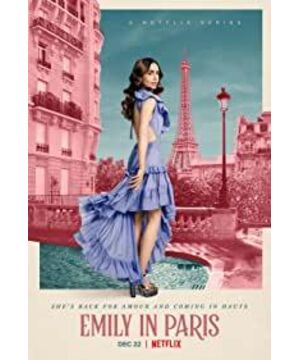(This article is first published on WeChat public account) "Emily in Paris" is full of falsehoods that can be seen through from head to toe. It is an American spiritual obsession with France and even Europe.
The core selling point of this drama is that the cultural collision is suspicious at first. This is not to say that there are corpse lynchers in the United States who do not want to work. There are also abnormal workaholics in France. sublimation--
When we use one culture to observe another culture, we hope to deepen our understanding and understanding of ourselves and others. It would be great if we can clarify some misunderstandings and prejudices. Anthropology teaches us that we may never be able to get rid of seeing the other through the eyes of the “subject/other”, but observation and thinking on the basis of introspection are still meaningful.
"Emily in Paris" does not have this kind of introspection and respect, but indulges in cheating for the heroine to let her use American culture and value to kill everyone. Not only French men, regardless of age, but also customers, Seeing one cut one, and if you cause trouble to the customer, you can also turn things around with the "sincerity" of rushing to the customer's private box (rather than a real change, not to mention this kind of intrusion into the private space is very impolite). Edition Lu Xiaokui.
What the heroine was talking about was "I bring the American perspective". And the American perspective she said is "going deep into the masses" and "down-to-earth" in a good way, or selling G-spots in a bad way. Since the first episode, every time she posts an ins (although it’s easy for viewers to wonder why these earthy selfies will quickly rise in popularity), the screen will show an increasing number of real-time fans. This is where social media traffic is king. The idea of ——
A basic logic of the whole show is that as long as I bring more traffic, I am right, and my colleagues also agree that she is right. At this point, the French and Americans seemed to have reached a consensus, and even some faint objections were immediately quelled by the heroine Tong Can Lianhua.
For example, the marketing strategy developed by the hostess for her girlfriend's family winery is to produce a champagne that is specially sprayed on people (not for drinking and tasting). In the author’s opinion, such a strategy can only be said to be a double victory of consumerism and utilitarianism. Since the champagne spilled by the show-off girl and the drinker can make money, then this "waste" What's wrong? But the girlfriend and mother who devoted themselves to inheriting the family winery felt that this problem was not a big problem after being slightly unwell. The battle between consumerism and faith inheritance ended with a big victory for the former.
In this way, the problem with this show is not that it is boring (after all, most chick comedies are this way), but it is disrespectful to the audience-deceiving people with cultural conflict gimmicks. If it were written as "the handsome French neighbor dog-eyed guy who is so handsome and tragic and has a wealthy girl fell in love with me", it would match the name.
The scene that made the author most uncomfortable was at the end of the series. The old Pierre Cadault encountered the gray space of emerging American street brands at the charity sale. The latter declared war on the old-school HighFashion by sending people to splash paint on haute couture, like a self-declaration of rebellious subculture. However, when the author saw that the sign of the gray space in the play was a large sweater that looked like a white silkworm chrysalis, I couldn't help but wonder whether the screenwriter is black France or black America? Let’s not say that the squad will wear the same clothes as the Stormtroopers. It is more convincing to pick a quick consumer on the market?
It can only be said that the screenwriter or costume design is very forceful to highlight the opposition between "elegant" and "vulgar". Leaving aside whether elegance and vulgarity are still so distinct in today's market, the consequence of this crash turned out to be—Old Pierre frustratedly admitted that only "old women" are now wearing my clothes. A few days later, in the street and gray space to fight or hit the field, changed the old style, wrapped the models in various red and green, and printed "I am tacky" and "I am basic bitch" (I'm a tacky bastard)" and other words. Old Pierre himself was wearing a custom model with his name printed on the gray space, shaking his legs and twisting his hips in excitement.
"I'm very tacky, but because of my existence, elegance is shown as elegance. You need me." This is what the hostess said when she persuaded Pierre to turn things around. But isn't this exactly the cultural relativism criticized by Alan Bloom in "The Closure of the American Spirit"? At the end of the above, when the old Pierre fought back and became the headlines of the major fashion media by declining his "brand style", is this a fashion out of the circle of elegance and vulgarity, or a prostitution? Victory?
We have the answer just by looking at those vulgar reds and greens. In fact, from the perspective of human settings, it is impossible for a “fashion old demon” like old Pierre, who has a perverted pursuit of beauty, to say that only “old women” wear his clothes. , It’s even less likely to be so depressed to lock yourself in the bedroom and knock on the pudding to vent.
It can only be said that Paris in the screenwriter’s head is a limited collection of labels: handsome, beautiful, arrogant and exclusive, romantic style, croissant, Eiffel Tower and Arc de Triomphe (just look at these two big guys every time you switch. ). Why is it a label, not even a symbol? Because the portrayal of these aspects in this play is indeed very superficial.
Europeans know that French people look down on people from other countries, and Parisians look down on people from other provinces. This stereotype with a solid foundation has even given birth to countless Paris jokes. But the screenwriter is too lazy to use the details. The screenwriter must make everyone scold naked ("countryman", "cheesy girl") regardless of occasion when the heroine does not understand French, as if the French do not understand social politeness. What is the same as workplace etiquette.
Just like romance, France is famous all over the world for romance, and there are countless such movies. The most familiar to Chinese people is probably the strong to sweet French romance in "Angels Love Beauty", "Without you, who would say the beautiful scenery on a good day" is still used by countless literary youths to hurt the spring and the autumn.
But the French romance of the show is superficially expressed as everyone has extramarital affairs, and one-night stands are everywhere-as for the romantic content? We did not see the French love words that are world-famous in "Emily in Paris". When the heroine's first love encounter blurted out "American pussy" after a few seconds of romance, I felt like the screenwriter had fed a fly.
Other characters portrayed in this play, such as the wealthy Chinese daughter who went to France to work as a nanny to escape from his father's control, are even more stereotyped and not worth mentioning.
In fact, any society and culture are diverse. When you overlook the city in Montmartre at sunset, and walk in the twinkling of the Eiffel Tower at night, you will feel that Paris is a cosmopolitan city and a romantic capital. But maybe a few steps away, a looting is taking place in a black hole community without lights.
Like many literary youths, the author once had a mouthful of the flower god cafe on the left bank. But one day, when the author struggled to ride a bicycle in the pouring rain, but because of the potholes on the road, when the boots were soaked in the mud, the author had something in my heart. Thousands of grass and mud horses whizzed past.
——This is also Paris. But of course it will not appear in "Emily in Paris". For a little sweet drama, we probably shouldn't expect more.
View more about Emily in Paris reviews











